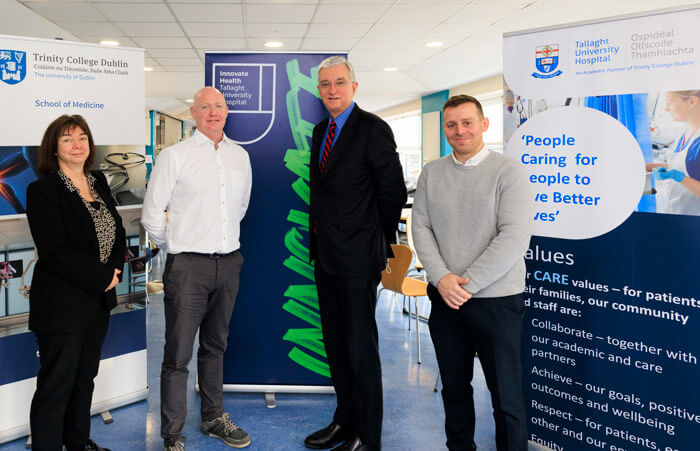
Tallaght University Hospital (TUH) and its interdisciplinary Chronic Pancreatitis team has developed an innovative mobile phone app, termed the SmartCP app, for patients with chronic pancreatitis.
This app empowers patients to take control of their condition and improve communication with the Hospital team. The app streamlines and coordinates patient management, and enables TUH to care for patients in their homes and communities, aligning with TUH’s vision of being ‘a hospital without walls’.
The SmartCP project is supported by an innovation grant from the Department of Public Expenditure and Reform. The project was coordinated by Professor Kevin Conlon Consultant Surgeon at TUH and Professor of Surgery at Trinity College Dublin, Dr. Sinead Duggan, a Senior Research Fellow in Trinity College Dublin and former TUH Nutrition & Dietetics Department member and Ms. Marie Egan, Clinical Nurse Specialist in TUH.
It was developed in collaboration with TUH’s Innovate Health Team, ICT & Finance Departments, as well as the Department of Computing in the Technological University Dublin. Patients with chronic pancreatitis have also been central to its design and development. In tandem with this project the group at TUH set up the first Patient Support and Advocacy Group for chronic pancreatitis in this country, Chronic Pancreatitis Ireland.
Chronic pancreatitis is a condition where the pancreas is inflamed and becomes progressively more damaged over time. Management centres around dealing with symptoms and complications as they arise. They are complex patients requiring specialist, multi-disciplinary care.
TUH research has shown that Ireland has among the highest numbers in Europe of those suffering from chronic pancreatitis.
TUH runs the biggest centre for chronic pancreatitis care on the Island of Ireland and currently has more than 300 patients on its clinical database. Many live outside Dublin. There are several types of out-patient clinics for chronic pancreatitis per week, including a Clinical Nurse Specialist led clinic and a specialist type 3c diabetes clinic.
Over the last 12 years the team has also built a robust research programme, focusing mainly on the nutritional and clinical management of patients with chronic pancreatitis. They have undertaken studies in diabetes, osteoporosis, small intestine bacterial overgrowth, genetics and nutrient deficiency. This research has been supported by the Health Research Board and the Meath Foundation.
Professor Kevin Conlon, project PI, said, “Our hospital is very well placed to take a lead on the development of this technology, we run the only dedicated chronic pancreatitis service nationally, providing care for over 300 patients. This new digital tool will improve patient access to specialist care, no matter where they live in the country. I and the team are grateful to DPER who awarded us with the Innovation funding, to the Meath Foundation who have funded much of our research over the years, and to the Innovate Health Team in TUH for their ongoing support and encouragement. Our Clinical Nurse Specialist, Ms. Marie Egan, is central to both the running of our service and to the practical roll out of this innovative technology.”
Dr. Sinead Duggan, project co-PI, said “Chronic pancreatitis is a complex disease requiring specialist, multi-disciplinary management. Our overall aim is to keep our patients healthier for longer, and to keep them out of hospital. SmartCP will empower patients with chronic pancreatitis, improving their quality of life and wellbeing. Whilst we have built a robust research programme over the last decade, traditionally chronic pancreatitis has been very much a neglected condition. We envisage that SmartCP will represent the lynchpin that enhances the quality of our service and facilitates a shift from illness to wellness, and ultimately towards an integrated care programme for chronic pancreatitis.”
Dr. Natalie Cole, Head of Innovation said, “The work to date in developing Smart CP is a great example of industry, academia and healthcare working together to develop an enabling technology to support our clinical team and empower our patients. We are very grateful to the Public Service Innovation Fund for their support for innovative ideas such as this.

